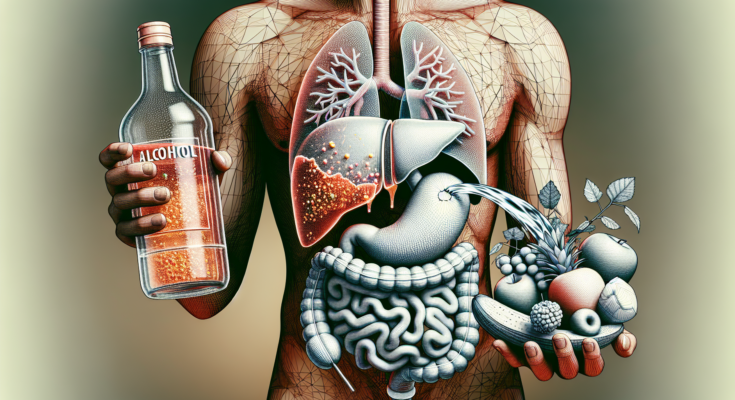Alcohol consumption is deeply ingrained in many cultures, often used as a means of socialization, relaxation, or celebration. However, its effects on health are multifaceted, ranging from short-term impacts to long-term consequences. While moderate consumption may not pose significant risks for some individuals, excessive or chronic drinking can lead to serious physical and psychological health problems. This article will explore the wide-ranging effects of alcohol on health, including its impact on the body, mind, and overall well-being.
1. The Impact of Alcohol on the Liver: Cirrhosis and Beyond
Alcohol is primarily metabolized by the liver, and excessive drinking can overwhelm the organ’s ability to process the substance. Chronic alcohol consumption can lead to several liver conditions, including fatty liver disease, alcoholic hepatitis, and cirrhosis. In severe cases, liver failure may result, requiring liver transplantation. This section will delve into how alcohol damages liver cells and the long-term consequences of this damage.
2. Alcohol and the Brain: Cognitive Decline and Mental Health
Alcohol has a significant effect on the brain, influencing neurotransmitter systems and impairing cognitive functions. Long-term heavy drinking is linked to cognitive decline, memory loss, and the development of mental health disorders such as depression, anxiety, and alcohol use disorder (AUD). This section will examine how alcohol affects brain chemistry, the risks of alcohol-induced dementia, and its role in mental health disorders.
3. The Cardiovascular System: Heart Disease, Hypertension, and Stroke
Moderate alcohol consumption has been linked to some cardiovascular benefits, such as increased levels of “good” HDL cholesterol. However, excessive drinking can damage the heart and blood vessels. Heavy alcohol use is associated with an increased risk of heart disease, hypertension (high blood pressure), arrhythmias (irregular heartbeats), and stroke. We will explore how alcohol affects the cardiovascular system and why moderation is key.
4. The Immune System: Alcohol’s Impact on Immunity
Alcohol can weaken the immune system, making the body more susceptible to infections and diseases. Chronic alcohol consumption impairs the production of white blood cells and decreases the effectiveness of the immune response. This section will discuss the ways alcohol suppresses immune function and its potential to increase the risk of conditions such as pneumonia, tuberculosis, and even certain cancers.
5. Alcohol and Cancer: A Hidden Danger
Alcohol is classified as a Group 1 carcinogen by the World Health Organization (WHO), meaning it is a known cause of cancer in humans. Research has shown that alcohol consumption increases the risk of several types of cancer, including liver, mouth, throat, esophageal, breast, and colorectal cancers. This section will examine the mechanisms by which alcohol contributes to cancer development and provide insights into how much alcohol is considered “safe” for cancer prevention.
6. Alcohol and Weight Gain: The Hidden Calories
Many people overlook the caloric content of alcoholic beverages. Alcohol is energy-dense, providing 7 calories per gram—more than carbohydrates and protein. Moreover, alcohol can disrupt the body’s ability to burn fat efficiently, leading to weight gain. This section will explore how alcohol can contribute to obesity, abdominal fat, and metabolic disorders such as insulin resistance.
7. The Gut: Digestive Problems and Alcohol’s Effect on the Microbiome
Alcohol can disrupt the balance of gut bacteria, which plays a crucial role in digestion and overall health. Chronic alcohol consumption can lead to digestive issues such as gastritis, acid reflux, ulcers, and even pancreatitis. Additionally, alcohol may increase the permeability of the gut lining, allowing toxins to enter the bloodstream, a condition known as “leaky gut.” This section will explore the relationship between alcohol, gut health, and the microbiome.
8. Alcohol and Sleep: Disruptions in Restorative Sleep
While alcohol may initially help people fall asleep faster, it significantly disrupts sleep patterns and reduces the quality of rest. Alcohol interferes with the sleep cycle, particularly REM (rapid eye movement) sleep, which is critical for memory consolidation and emotional regulation. This section will examine the short-term and long-term effects of alcohol on sleep, including the increased risk of sleep disorders such as insomnia and sleep apnea.
9. Alcohol and Mental Well-being: Anxiety, Depression, and Stress
Alcohol is often used as a form of self-medication for individuals struggling with anxiety or depression. However, alcohol can worsen these conditions over time, leading to a cycle of dependence. Chronic alcohol consumption alters brain chemistry in ways that can exacerbate mental health issues and make it more difficult to recover. This section will explore the complex relationship between alcohol use and mental health, including how alcohol can contribute to a range of emotional and psychological problems.
10. Moderation vs. Excess: Understanding Safe Alcohol Consumption
While excessive drinking is harmful, moderate alcohol consumption may have some benefits, particularly in terms of cardiovascular health. However, the definition of “moderation” varies by individual, and what is considered safe for one person may not be safe for another, depending on factors like age, sex, genetics, and pre-existing health conditions. This section will discuss the concept of moderate drinking, the guidelines for alcohol consumption, and the factors that affect how alcohol is processed by the body.
The Complex Relationship Between Alcohol and Health
The effects of alcohol on health are complex and multifaceted, ranging from short-term impairments in judgment and coordination to long-term risks for chronic diseases and mental health disorders. While moderate consumption may be safe for some individuals, the potential for harm increases with excessive and prolonged use. Understanding the risks and benefits of alcohol can help individuals make informed decisions about their drinking habits and protect their long-term health. If you are concerned about the effects of alcohol on your health, consider consulting a healthcare professional for personalized advice and support.
By exploring alcohol’s wide-reaching impacts on various bodily systems, we can better understand the potential risks and make informed choices regarding alcohol consumption. Whether you choose to drink or abstain, it is important to stay mindful of how alcohol affects your health and well-being.



